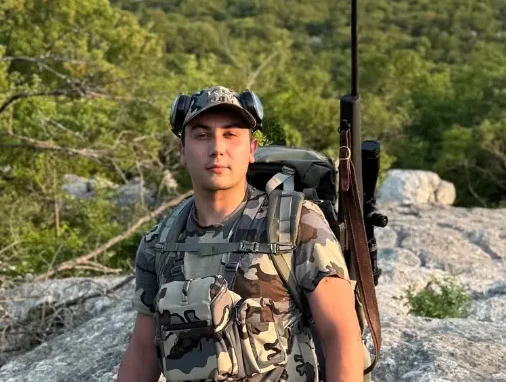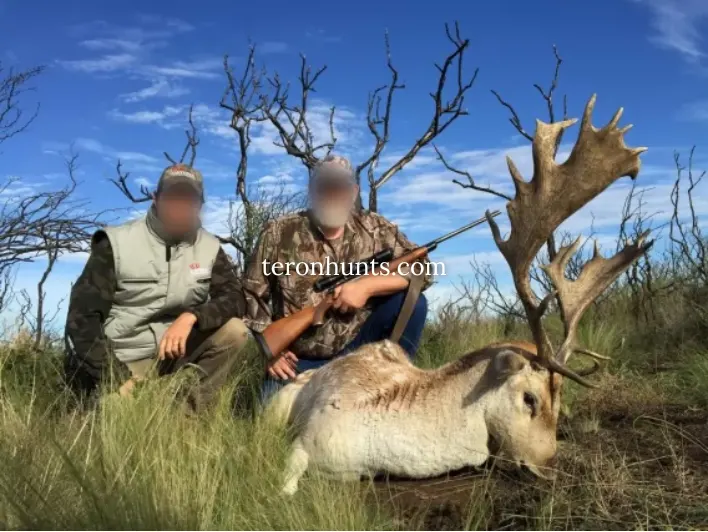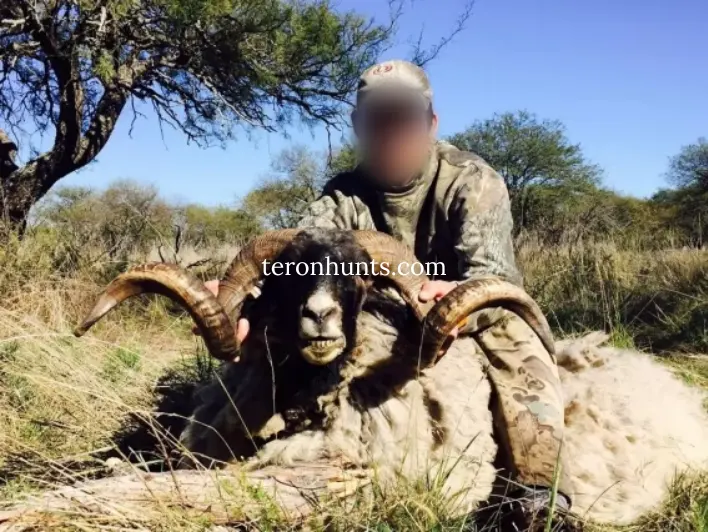Home » Hunting Destinations » Hunting in Argentina
Hunting in Argentina 🇦🇷
Quick Navigation
How to book a hunt?
Send Us An Inquiry
Get Tailored Offers & Confirm With Deposit
Your Hunt Is Locked In – We’ll Handle The Rest
From permits to logistics, we’ll make sure everything’s arranged. You just focus on the hunt—our team is here if you need anything along the way.
Choose Your Next Argentina Trophy
Water Buffalo
Red Deer
Blackbuck
Four Horned Ram
Axis Deer
Texas Dall Ram
Mouflon
Hybrid Mouflon
Fallow Deer
Wild Boar

Hey, I’m Toni!
I’m here to help you with any questions or potential challenges you might have. Just reach out to me on WhatsApp, and I’ll get back to you as soon as I see your message.
1-on-1 Advice | Free Service | 100% Non-Binding
Included
- Accommodation (double based rooms)
- Free WI-Fi
- World class cuisine (+game meals)
- Drinks (wine, beverages)
- Professional guiding service (2x1)
- Field preparation of trophies
- Transportation of trophies to the broker in Buenos Aires
- Transportation to and from the hunting fields
- English speaking host
- Full use of lodge facilities
NOT Included
- International and domestic airfares
- Ground transfers in Buenos Aires
- Airport Transfer to and from the lodge ($200/person)
- Hunting license (w/trophy guide $400/person)
- Rifle rental ($300/person)
- Ammunition ($50/box)
- Taxidermy and trophy shippment
- Gratuities
Booking & Cancellation Policy
A 50% deposit is required to book the hunt. Balance should be paid 60 days before the hunt.
This deposit is non-refundable and the following cancellation fees apply:
* 90 days prior to the hunt: can be transferred for other available date or following season (new fees will
apply).
* 60 days prior to the hunt: can be transferred for other available date or following season (new fees will
apply), 50% of the deposit is lost.
* 30 days prior to the hunt: can be transferred for other available date or following season (new fees will
apply), 100% of the deposit is lost.
Trusted & Secure
Hunt with peace of mind. No hidden traps—just transparent, safe adventures.
Easy & Hassle-Free
Forget endless planning and uncertainty. With just a few clicks, you’re booked and ready to go. Quick, clear, and built for a smooth hunting experience.
Hunts For Every Budget
From affordable to high end. We offer hunting experiences for all budget sizes.
By submitting this form, you agree to our Terms & Conditions and Privacy Policy.
Hunt In Argentina With Teron
Do I need a visa to travel to Argentina for a hunting trip?
Most hunters traveling to Argentina do not need a visa for stays of up to 90 days, including for tourism and hunting purposes. This applies to citizens of the United States, Canada, the European Union, the United Kingdom, Australia, New Zealand, and many other countries. However, travelers must ensure their passport is valid for at least six months beyond their intended departure date from Argentina.
While Argentina does not currently require a visa for short-term visits from most Western countries, travelers from certain countries (such as India, China, Russia, and several African and Middle Eastern nations) do require a visa and must apply in advance at the nearest Argentine consulate.
To avoid any issues or delays upon arrival, it is highly recommended to verify your visa status based on your nationality through the Argentine Ministry of Foreign Affairs or by contacting your local embassy.
If you have any questions or need assistance with travel arrangements, feel free to contact Toni at [email protected].
When is the hunting season in Argentina?
The hunting season in Argentina mostly takes place between March and August.
For big game hunters, the prime season runs from March to August, with the red stag rut peaking between mid-March and early April—a highly sought-after period for trophy hunters. Other species such as axis deer, fallow deer, blackbuck antelope, mouflon, wild boar, and water buffalo can also be hunted during this timeframe, with some extending into November depending on the area and outfitter.
Bird hunting in Argentina is exceptionally popular and offers more flexibility. Dove hunting is available year-round with no bag limits, while species like duck and partridge are best pursued between May and August. Pigeon hunting is typically offered from September through April, with mixed-bag options available in the off-season.
What documents are needed to apply for a firearm permit in Argentina?
If you plan to bring your personal firearm into Argentina for hunting purposes, you must obtain a Temporary Firearm Import Permit before your trip. This process is overseen by ANMaC (Agencia Nacional de Materiales Controlados), Argentina’s national firearms authority.
Required Documents:
Completed ANMaC Application Form: Fill out the official form accurately, leaving no fields blank. If a section doesn’t apply, mark it as “N/A”.
Notarization and Authentication:
Sign the completed form in the presence of a Notary Public.
Have the notary’s signature authenticated by the appropriate authority (e.g., County Clerk).
Supporting Documents:
A clear copy of your valid passport.
A recent passport-sized photograph.
Proof of firearm ownership (such as a customs declaration form).
A copy of your driver’s license.
Your travel itinerary, including flight details.
A copy of your hunting license, if applicable.
Consular Fee:
Include a money order payable to the “Consulate of Argentina” for the required fee (e.g., USD 60 for processing up to three firearms).
Return Envelope:
Provide a self-addressed, prepaid envelope for the return of your processed documents.
Once your application is processed and approved, the consulate will return the form with an official seal. You must present this sealed document to Argentine authorities upon arrival.
Important Considerations:
Firearm Types: Certain firearms, such as pump-action or semi-automatic shotguns, may have additional requirements or restrictions. It’s crucial to verify the specific regulations pertaining to your firearm type.
First-Time vs. Repeat Visitors: If this is your first time bringing a firearm into Argentina, the process may differ from that for repeat visitors. Ensure you understand the requirements applicable to your situation.
Translation of Documents: Any documents not in Spanish may need to be accompanied by an official translation.
What are the hunting laws and regulations in Argentina?
The official hunting season in Mozambique runs from 1 April to 30 November. Hunters are only permitted to hunt species for which they have a valid permit issued in their name. At Teron Hunts, we take care of all permit applications well ahead of your safari dates.
Since all hunting is subject to quota availability, it’s crucial to inform us of the specific species you wish to hunt well in advance. Permits must be obtained prior to the start of the hunt.
Hunting is strictly allowed during daylight hours, typically from half an hour before sunrise to half an hour after sunset. Exceptions to this rule are rare. The minimum number of days for a safari depends on the species being hunted: for example, Leopard requires a 15-day minimum, Cape Buffalo requires 12 days, and Lion requires 18 days.
It is illegal to hunt pregnant females, females with dependent young, or immature animals. If a female is accidentally shot, you will be charged the same fee as for a male, but the trophy will not be eligible for export.
To ensure a traditional and ethical hunting experience, Teron Hunts requires that all hunting be done on foot, after reaching the hunting area by vehicle. Hunters must be at least 200 yards away from an animal when shooting from the ground. However, crocodiles may be hunted from a boat.
Each hunter must have their own Model A hunting license, and we will assist in obtaining all the necessary permits for you.
Additionally, Problem Animal Control (PAC) hunts are not allowed, and hunting of species such as klipspringer, caracal, jackals, civet, serval, honey badger, and roan antelope is prohibited in Mozambique.
How to deal with jetlag during your Argentina hunt?
Jetlag can be particularly challenging when traveling east, which means hunters flying in from the US may feel it more than those coming from Europe. The symptoms, such as fatigue, headaches, muscle soreness, and digestive issues, can really take away from your safari experience with Teron Hunts if you don’t take steps to manage them.
Here are some strategies to help you handle jetlag before and during your trip:
- Adjust your sleep schedule in advance: Gradually shift your sleeping hours to match the time zone of your destination a few days before departure.
- Synchronize your meals: Start eating according to the local time of your destination to help your body acclimate.
- Sleep when it’s night at your destination: If you arrive at night, try to rest on the plane. However, avoid napping if it’s daytime at your destination.
- Hydrate well: Drink plenty of water to stay hydrated during your flight. Limit alcohol and caffeine intake, as they can contribute to dehydration.
- Resist the urge to nap upon arrival: As tempting as it may be to nap after you land, try to stay awake and adjust to the local time by getting some sunlight and sticking to the new schedule.
- Arrive a day or two early: If you know jetlag tends to hit you hard, consider arriving a few days before your safari to give your body a chance to adjust to the new time zone.
Taking these steps will help you overcome jetlag faster, allowing you to fully enjoy your safari experience with Teron Hunts.
Can my Argentina hunting trip be documented on video and/or photographed?
Yes, your hunting safari in Mozambique can absolutely be documented. If you’d like professional-quality footage, we offer the services of an experienced cameraman at a rate of $350 per day, which includes filming, photography, and full editing of your safari highlights.
Let us know in advance if you’d like this service added to your hunt, so we can arrange everything before your arrival.
Can my observer/guest go with me during my hunt in Argentina?
Yes, observers or non-hunting guests are welcome to accompany you on your safari in Mozambique. The observer fee is $350 per person per day, which includes their accommodation, meals, and participation in daily activities alongside you during the hunt.
It’s a great way for family or friends to share in the experience—even if they’re not hunting themselves.
Should I have insurance for my hunting trip to Argentina?
Yes, having insurance is highly recommended, especially if you plan to hunt dangerous animals. Hunting liability insurance covers accidents and injuries. If needed, we can arrange insurance for you, or you can obtain coverage through our partner, Global Rescue, at this link: https://partner.globalrescue.com/bookandhunt/index.html.
Are translators available for my Argentina hunting trip?
Yes, translators are available upon request for your hunting safari in Mozambique. The fee for a translator or agent is $100 per day. This ensures clear communication throughout your experience, especially if you’re not fluent in English or Portuguese.
How is my trophy taken care of?
Your trophies will be field prepared in camp and then transported to our trusted dip and pack agent, Life Form Taxidermy. They handle the entire export process, preparing your trophies for shipment to your nominated taxidermist or directly to your specified destination.
Life Form is highly experienced and up-to-date with all export regulations, including US Fish and Wildlife Service requirements, ensuring your trophies are handled professionally and in full compliance.
Dip and pack fees are quoted separately. For current pricing, please contact us directly.
Can I rent a weapon for my Argentina hunting trip?
Yes, weapon rental is available at $30 per weapon per day, and ammunition is charged at $15 per round.
Please note: These charges apply for the entire duration of the safari, not just the days the weapon is used.
What gear should I pack for my hunting trip in Argentina?
We recommend packing dark green, dull green, or dark khaki clothing made of cotton or similar breathable fabrics. Camouflage (like mossy oak) is allowed, as long as it’s not military-style camo.
Daily laundry service is available, so there’s no need to overpack. Here’s a suggested packing list:
Clothing:
3 pairs long trousers
3 pairs shorts
3 long-sleeved shirts
3 short-sleeved shirts
1 hunting jacket (for cool mornings)
1 warm sweater (for evenings)
Lightweight rain gear or coverall
2 pairs of light hunting shoes or boots (canvas or leather, not waterproof)
1 pair of tennis shoes or slippers for camp
1 wide-brimmed hat
1 set of light sleepwear
6 pairs of socks
Underwear
Medical and Personal Items:
Any personal medication prescribed by your doctor
Headache tablets
Diarrhea tablets
Bandaids
Antibiotics
Insect repellent (high DEET recommended)
Talcum powder
Eye drops
Itch relief stick or spray
Avon Skin So Soft (excellent for Tsetse flies)
Sunscreen (high SPF)
Lip balm with sun protection
Our camps are well-stocked with first aid kits, but it’s always wise to bring your essentials.









